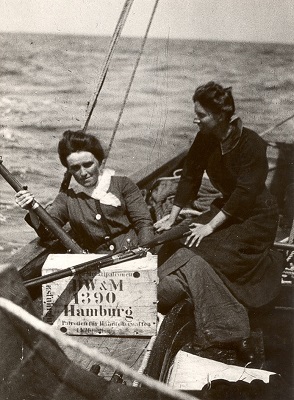Life
1880-1924; Protestant nationalist; dg. of Lord Mounteagle; related to
the de Vere family; grew up on the Mount Trenchard family estate, Co. Limerick; member the Connradh na Gaeilge [Gaelic League] and frequent host to its meetings; purportedly suggested Howth gun-running and participated in it with Molly Childers and others, raising £2,000 for purchase of Mauser rifles; sailed the Asgard to Germany to collect them and returned to Ireland, unloading in Howth harbour, 26 July 1914; supplied safe haven for IRA at Mount Trenchard during the War of Independence; also hosted English Liberal leaders in support of Home Rule - a facade for her Republican activities; d. of tuberculosis in Wales, 1 Dec. 1924; bur. Mount Trenchard.
 |
| Unloading the Asgard, 26 July 1914 |
[ top ]
Criticism
Peadar Ó hAnnracháin, Fé bhrat an Chonnartha (Baile Átha Cliath: Oifig an tSolathair 1944); ‘Diary of Mary Ellen Spring Rice’, in F. X. Martin, ed., The Howth Gun-running (Dublin 1964); Dominic Daly, The Young Douglas Hyde (1974), p.146, and p.218n.
See also Oliver Snoddy, ‘Notes on Literature in Irish Dealing with the Fight for Freedom’, in Éire-Ireland, 3, 2 (Summer 1968), pp. 138-48.
[ top ]
Commentary
Mark Storey, Poetry and Ireland Since 1800: A Source Book (London: Routledge 1988), notes to Douglas Hyde, “On the Necessity for the De-Anglicising of Ireland” [pp.78-84, gives an ccount of Thomas Spring-Rice (1790-1866), first Baron Monteagle of Brandon in Kerry, who is ‘said by the OED [Oxford English Dictionary] to be the first Irishman to have nicknamed himself a “West Briton”. It soon became a term of abuse amongst Irish nationalists, and crops up frequently in the debate, and in fictional representations of that debate (such as Joyce’s Dubliners)’. (Storey, op. cit., p.84.)
[ top ]
Notes
Thomas Moore, in Captain Rock (London 1824), cites an article on the difference between English and Irish Tithes, printed in the Inquirer, ‘for which’ - Moore writes - ‘I suspect we are indebted
the pen of that enlighted and patriotic member of Parliament, Mr. Spring Rice.’ (p.300n.)
James Hardiman, ed., Irish Minstrelsy, Bardic Remains (London: Robins 1831), bears the dedication: To the Right Honorable / Thomas Spring Rice,/ Representative in Parliament for the City of / Limerick, / A Steady Friend to the Best Interests of Ireland, / This Work, / Undertaken with a View to Preserve and Illustrate / A Portion of Ancient Irish Literature, / Is resepctfully inscribed / by his obedient servant, / James Hardiman. / Dublin, September 1st, 1831.
[ top ]